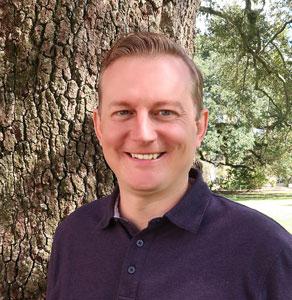Jonathan P. Fadok, Ph.D.
Associate Professor

Education & Affiliations
Biography
Dr. Fadok’s research is focused on understanding how the brain controls the formation and expression of emotional memory at the level of defined neuronal circuits. He is currently interested in understanding how brain-wide neuronal networks interact to influence learning and adaptive behavior. Work in his laboratory involves using cutting-edge methodology such as large-scale in vivo recordings of neuronal activity, targeted manipulations of function in behaving animals, as well as cell-type specific neuroanatomical tracing techniques.
Office
208 Flower Hall
Selected Publications
Borkar, C.; Fadok, JP. (2021) A novel Pavlovian fear conditioning paradigm to study freezing and flight behavior. Journal of Visualized Experiments. 167: e61536. DOI: 10.3791/61536
Borkar, C; Dorofeikova, M; Le, QE, Vutukuri, R; Vo, C; Hereford, D; Resendez, A; Basavanhalli, S; Sifnugel, N; Fadok, JP. (2020) Sex differences in behavioral responses during a conditioned flight paradigm. Behavioural Brain Research. 389: 112623. DOI: 10.1016/j.bbr.2020.112623
Fadok, JP; Markovic, M; Tovote, P; Lüthi, A. (2018) New perspectives on central amygdala function. Current Opinion in Neurobiology. 49:141-147. https://www.sciencedirect.com/science/article/abs/pii/S0959438817302374?via%3Dihub
Fadok, JP; Krabbe, S; Markovic, M; Courtin, J; Xu, C; Massi, L; Botta, P; Bylund, K; Müller, C; Tovote, P; Lüthi, A. (2017) A competitive inhibitory circuit for selection of active and passive fear responses. Nature. 542(7639): 96-100. http://dx.doi.org/10.1038/nature21047.
Xu, C; Krabbe, S; Botta, P; Fadok, JP; Gründemann, J; Osakada, F; Saur, D; Grewe, B; Schnitzer, M; Callaway, EM; Lüthi, A. (2016) Distinct hippocampal output pathways mediate dissociable roles of context in associative memory retrieval. Cell. 167(4): 961-972. http://dx.doi.org/10.1016/j.cell.2016.09.051.
Tovote, P; Esposito, MS; Botta, P; Chaudun, F; Fadok, JP; Markovic, M; Wolff, SB; Ramakrishnan, C; Fenno, L; Deisseroth, K; Herry, C; Arber, S; Lüthi, A. (2016) Midbrain circuits for defensive behavior. Nature. 534(7606): 206-12. http://dx.doi.org/10.1038/nature17996.
Tovote, P; Fadok, JP*; Lüthi, A. (2015) Neuronal circuits for fear and anxiety. Nature Reviews Neuroscience. 16(6): 317-31. http://dx.doi.org/10.1038/nrn3945. *Co-first author.
Botta, P; Demmou, L; Kasugai, Y; Markovic, M; Xu, C; Fadok, JP; Lu, T; Poe, MM; Xu, L; Cook, JM; Rudolph, U; Sah, P; Ferraguti, F; Lüthi, A. (2015) Regulating anxiety with extrasynaptic inhibition. Nature Neuroscience. 18(10): 1493-500. http://dx.doi.org/10.1038/nn.4102.
Zweifel, LS; Fadok, JP*; Argilli, E; Garelick, MG; Jones, GL; Dickerson, TM; Allen, JM; Mizumori, SJ; Bonci, A; Palmiter, RD. (2011) Activation of dopamine neurons is critical for aversive conditioning and prevention of generalized anxiety. Nature Neuroscience. 14(5): 620-6. http://dx.doi.org/10.1038/nn.2808. *Co first-author.
Fadok, JP; Dickerson, TM; Palmiter, RD. (2009) Dopamine is necessary for cue-dependent fear conditioning. Journal of Neuroscience. 29(36): 11089-11097.http://dx.doi.org/10.1523/JNEUROSCI.1616-09.2009.
